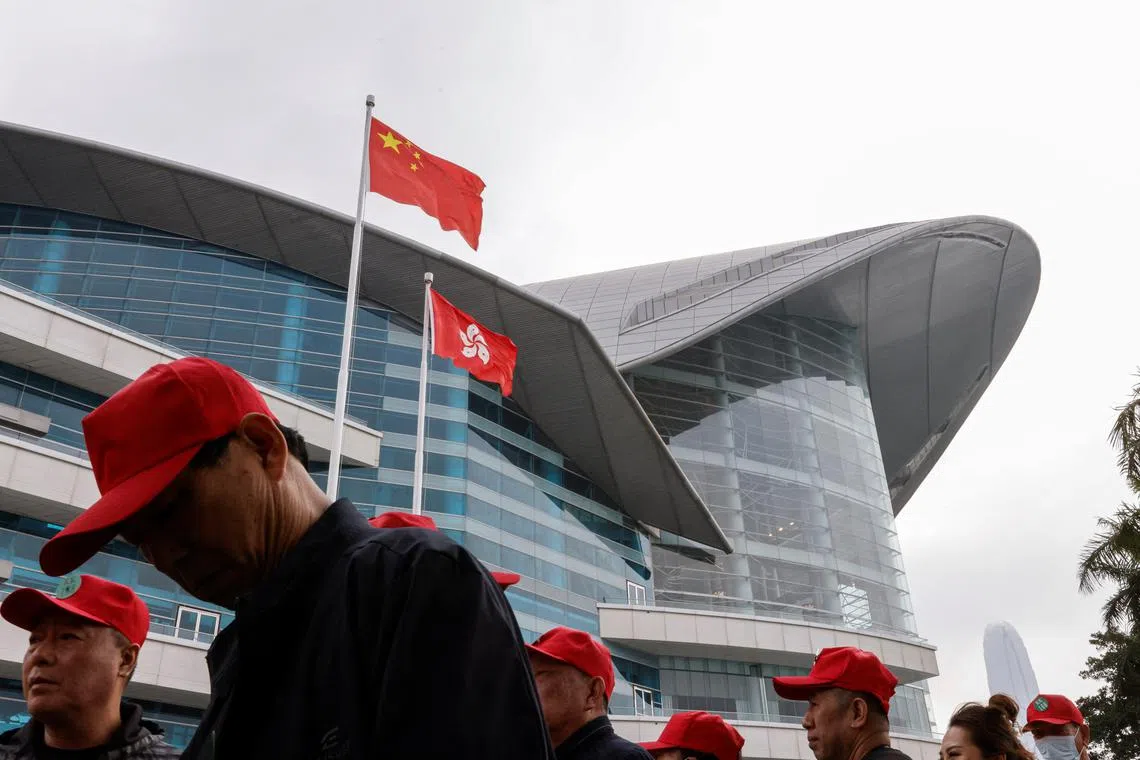China blasts criticism of new Hong Kong security law as ‘smears’
Sign up now: Get insights on Asia's fast-moving developments

Hong Kong's government has argued that the creation of the law was a “constitutional responsibility”.
PHOTO: REUTERS
Follow topic:
BEIJING – China blasted critics of Hong Kong’s new national security law on March 20, after Western powers and the United Nations said it would further curtail freedoms in the city.
The city’s legislature passed the law unanimously
Commonly referred to as Article 23, the home-grown security law will work in tandem with a 2020 Beijing-imposed version
Western nations, including the United States and former colonial power Britain were swift to criticise the new law, with British Foreign Minister David Cameron saying it would “further damage the rights and freedoms enjoyed in the city” and calling the legislation “rushed”.
Beijing’s Foreign Ministry spokesman Lin Jian fired back on March 20, telling reporters that “attacks and smears” against the new Hong Kong law by other governments and outside groups were “doomed to fail”.
“Security is a prerequisite for development and the rule of law is the cornerstone of prosperity,” Mr Lin said.
China’s de facto Foreign Ministry in Hong Kong earlier blasted Britain’s “coloniser” mindset and accused it of “exercising double standards”, an apparent reference to its own national security laws.
The US, United Nations, European Union and Japan have also publicly spoken out against the law.
Australia’s top diplomat Penny Wong on March 20 warned her visiting Chinese counterpart Wang Yi in Canberra
Under Britain’s handover agreement to China, Hong Kong was guaranteed certain freedoms, including judicial and legislative autonomy, for 50 years in a deal known as “one country, two systems”.
The accord cemented the city’s status as a world-class business hub, bolstered by a reliable judiciary and political freedoms distinct from the mainland.
But the massive and at times violent democracy protests in 2019
The national security law Beijing imposed on Hong Kong in 2020
The newly passed law, which punishes treason, insurrection, theft of state secrets and espionage, sabotage and external interference, will work in tandem to plug up “gaps” left by Beijing’s legislation, Hong Kong’s leader John Lee has said.
The government has argued its creation was a “constitutional responsibility” as outlined under Article 23 of Hong Kong’s mini-Constitution, which has governed the city since the handover.
But Mr Cameron said the fast-tracked legislation undermined the Sino-British Joint Declaration, an internationally binding agreement signed in 1984 in which China agreed to run Hong Kong under the “one country, two systems” principle.
“I urge the Hong Kong authorities to... uphold its high degree of autonomy and the rule of law and act in accordance with its international commitments and legal obligations,” he said.
His statement also drew a rebuke from the Chinese Embassy in Britain, which called it “a serious distortion of the facts”.
The embassy said the law, which imposes life imprisonment for crimes related to treason and insurrection, “fully safeguards the rights and freedoms enjoyed by Hong Kong residents”.
“We urge the United Kingdom to cease its baseless accusations... refrain from interfering in China’s internal affairs under any pretext,” it said.
US State Department spokesman Vedant Patel said on March 19 that the US was “alarmed by the sweeping and what we interpret as vaguely defined provisions” in the law.
UN rights chief Volker Turk called the law and its “rushed” adoption “a regressive step for the protection of human rights”.
The EU criticised not only the expected impact of the law on the city’s freedoms overall, but also specifically said it had the “potential to significantly affect the work of the EU’s office”, European consulates and EU citizens in Hong Kong.
“This also raises questions about Hong Kong’s long-term attractiveness as an international business hub,” the EU said in a statement on March 19.
Mr Thomas Kellogg, executive director of Georgetown’s Centre for Asia Law, agreed, saying the new law would “further erode” the elements that had made the city attractive to foreign business: rule of law, openness and transparency.
“This law does damage to those elements of Hong Kong’s distinctiveness while doing nothing to address the actual problems that Hong Kong faces,” he said. AFP

